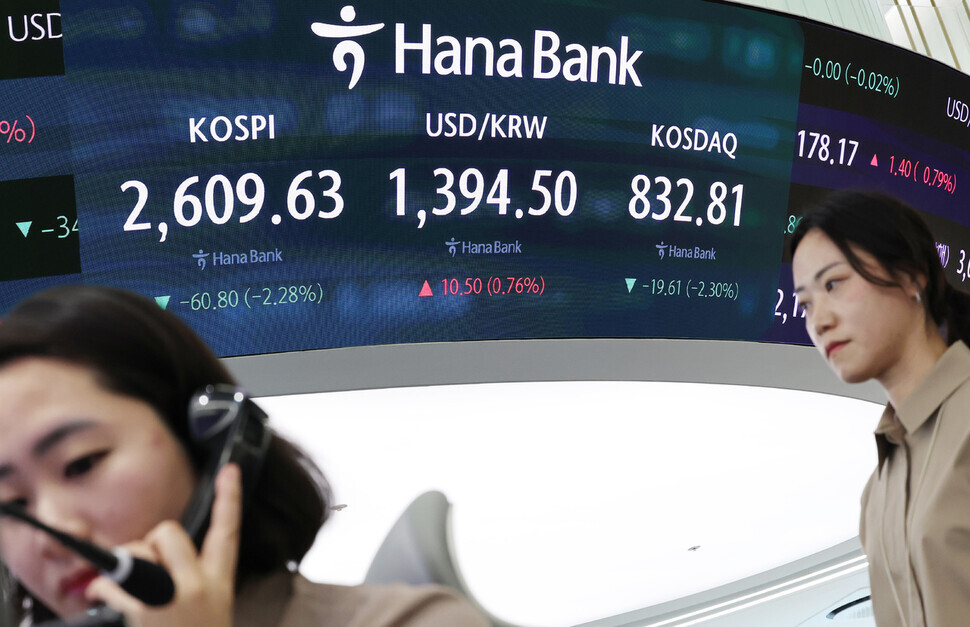hankyoreh
Links to other country sites 다른 나라 사이트 링크
Strong dollar isn’t all that’s pushing won exchange rate into to 1,400 range

South Korea’s financial market is roiling from the effects of the crisis in the Middle East and the strong US dollar.
With the won-to-dollar exchange rate rising to the 1,400 mark, stock values have fallen sharply and bond interest rates have spiked. Some are voicing fears that the political situation in the Middle East could lead to the high exchange rate and high prices (including oil) continuing into the long term.
As many increasingly predict the US Federal Reverse will put off a reduction in interest rates, the recent strength of the dollar — and weakness of the won — has been compounded by an intensifying preference for safe assets amid the mounting threat of war in the Middle East following Iran’s air attack on Israel over the weekend.
In the case of the won, the decline in value has been especially steep compared with other currencies.
For seven straight trading days between April 4 and 16, the exchange rate continued rising, indicating a depreciation in the won’s value. Its peak on Tuesday — when it reached 1,400.0 to the dollar on the Seoul foreign exchange market at one point during trading — marked a rise of 52.90 won, or 3.93%.
In contrast, the period from April 4 to 15 saw declines of only 0.05% for the yuan, 1.76% for the yen, 2.27% for the euro, and 1.74% for the British pound.
Analysts pointed to “seasonal specificity” as a factor in the won’s large depreciation. With dividends for foreign investors falling largely in April, there has been a surge of demand to convert those funds into dollars for overseas transfer.
In a report published Monday, the UK investment bank Barclays made a prediction — based on the dividend schedule for South Korean companies and the overseas transfer trend — that the won was likely to remain weak for at least the next several weeks.
Market observers predicted foreign investors would collect as much as US$6.2 billion in dividends this month. At the same time, some analysts said that with South Korean companies also collecting much of their dividends from overseas affiliates in April, the increased domestic supply in dollars may cancel out some of the upward pressures on the exchange rate.
Min Geong-won, a foreign exchange analyst at Woori Bank, said, “The inability to arrest the rise in the exchange rate has less to do with dollar supply factors than with the fact that the recent rate increase has been strong enough to break through the trading ceiling, so that even export-oriented businesses are finding themselves unable to put their dollars on the market.”
The high exchange rate has also caused a strain on the South Korean stock market.
From the standpoint of foreign investors converting dollars to won, the currency’s weakness translates into foreign exchange losses. On Tuesday, foreign investors recorded net sales of 274.6 billion won; on the futures market, the selloff trend among foreign investors was even stronger.
As risk factors in the Middle East drive up oil prices, the result is a double whammy of a strong dollar and high prices for a crude oil-importing country like South Korea. On Tuesday, the won-to-dollar exchange rate managed to finish the day just under the 1,400 mark thanks to strong official intervention announcements by foreign exchange authorities.
Park Sang-hyeon, an analyst with Hi Investment and Securities, observed, “The decline in the won’s value this month has been the biggest among the 31 major economies.”
“A return to an exchange rate above 1,400 won appears inevitable if [West Texas Intermediate] oil prices rise above US$90,” he predicted.
By Kim Hoe-seung, senior staff writer; Nam Ji-hyeon, staff reporter
Please direct questions or comments to [english@hani.co.kr]

Editorial・opinion
![[Guest essay] Maybe Korea’s rapid population decline is an opportunity, not a crisis [Guest essay] Maybe Korea’s rapid population decline is an opportunity, not a crisis](https://flexible.img.hani.co.kr/flexible/normal/500/300/imgdb/original/2024/0430/9417144634983596.jpg) [Guest essay] Maybe Korea’s rapid population decline is an opportunity, not a crisis
[Guest essay] Maybe Korea’s rapid population decline is an opportunity, not a crisis![[Column] Can Yoon steer diplomacy with Russia, China back on track? [Column] Can Yoon steer diplomacy with Russia, China back on track?](https://flexible.img.hani.co.kr/flexible/normal/500/300/imgdb/original/2024/0430/1617144616798244.jpg) [Column] Can Yoon steer diplomacy with Russia, China back on track?
[Column] Can Yoon steer diplomacy with Russia, China back on track?- [Column] Season 2 of special prosecutor probe may be coming to Korea soon
- [Column] Park Geun-hye déjà vu in Yoon Suk-yeol
- [Editorial] New weight of N. Korea’s nuclear threats makes dialogue all the more urgent
- [Guest essay] The real reason Korea’s new right wants to dub Rhee a founding father
- [Column] ‘Choson’: Is it time we start referring to N. Korea in its own terms?
- [Editorial] Japan’s rewriting of history with Korea has gone too far
- [Column] The president’s questionable capacity for dialogue
- [Column] Are chaebol firms just pizza pies for families to divvy up as they please?
Most viewed articles
- 1Under conservative chief, Korea’s TRC brands teenage wartime massacre victims as traitors
- 2[Guest essay] Maybe Korea’s rapid population decline is an opportunity, not a crisis
- 3Value of Korean won down 7.3% in 2024, a steeper plunge than during 2008 crisis
- 4Months and months of overdue wages are pushing migrant workers in Korea into debt
- 5[Column] Can Yoon steer diplomacy with Russia, China back on track?
- 6After election rout, Yoon’s left with 3 choices for dealing with the opposition
- 7Two factors that’ll decide if Korea’s economy keeps on its upward trend
- 8First meeting between Yoon, Lee in 2 years ends without compromise or agreement
- 9‘We must say no’: Seoul defense chief on Korean, USFK involvement in hypothetical Taiwan crisis
- 10Strong dollar isn’t all that’s pushing won exchange rate into to 1,400 range